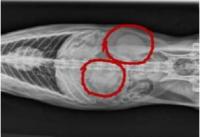Kidney Disease
As our pets are living longer and longer, there is a slow but steady loss of kidney function in all pets. Kidney disease is something that every pet parent will experience if your pets live long enough and don’t succumb to another illness or disease. While most pets don’t start having a decline in kidney function until they are teenagers, some will have problems with kidney function or even experience complete kidney failure earlier in their lives.
Symptoms of Kidney Disease
The first signs of kidney disease are, unfortunately, often ignored. Most owners notice an increase in thirst and/or urination. You may notice that your cat is drinking from the sink suddenly, or your dog is waking you up in the middle of the night or earlier in the mornings to go outside.
Other symptoms of kidney disease present themselves as the decline in renal function is much more advanced and include: vomiting, constipation, loss of appetite, lethargy, weight loss, bad breath (giving off an ammonia-like odor) and nausea (licking lips or swallowing excessively). Anemia can also develop in chronic kidney disease leading to weakness, pale gums, and eating odd things. Unfortunately, if you wait until you see these more advanced signs, your pet’s condition may not be as easily treatable.
Types and Causes of Kidney Disease
Kidney disease can be either acute, which is a sudden onset decline of kidney function that may be reversible, or chronic. Your veterinarian will need to quickly determine the cause of renal failure. The causes of any loss of kidney function include chronic infections like Lyme disease, skin infections, gum disease, or intestinal disease. Other diseases like adrenal diseases, diabetes, autoimmune conditions, feline infectious peritonitis, and cancer, as well as some rare genetic diseases, can also cause renal failure. Hyperthyroidism in dogs but especially cats can also unmask kidney disease when it is treated.
Diagnosis
The first laboratory indication of kidney disease is a decrease in the specific gravity, or concentration, of your pet’s urine. This will occur before there are noticeable changes in the blood levels. Usually, though, by the time you have noticed the earliest signs of kidney disease like increased drinking and urination, your pet will already have progressed to a stage in which there are changes in his blood values.
Even if there are noticeable changes in your pet’s bloodwork, the kidney disease may be in an early stage if the elevations are only in creatinine and BUN and are slight. If other tests are normal, your pet may require monitoring or changes in diet, but additional testing to look for an underlying cause may be recommended as well.
Treatment
Proper diagnosis of the underlying cause of your pet’s kidney failure is important in determining the appropriate treatment. For instance, inflammatory conditions require anti-inflammatory medications, infections require antibiotics, cancer requires surgery or chemotherapy, obstructions may require catheterization or surgery, and so on.
If no underlying cause is found that requires specific treatment and your pet is diagnosed with chronic renal failure, this condition is progressive and will continue to worsen over time. However, the process can take a very long time and there are many things that can be done to slow down this progression. Kidney disease does not have to be a death sentence for your pet. There are many treatment options ranging from diet changes and medication to fluid therapy or even a kidney transplant!
All articles are reviewed and maintained by whiskerDocs team of veterinary experts.



